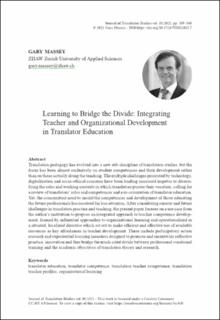Please use this identifier to cite or link to this item:
https://doi.org/10.21256/zhaw-22970| Publication type: | Article in scientific journal |
| Type of review: | Peer review (publication) |
| Title: | Learning to bridge the divide : integrating teacher and organizational development in translator education |
| Authors: | Massey, Gary |
| et. al: | No |
| DOI: | 10.3726/JTS012021.7 10.21256/zhaw-22970 |
| Published in: | Journal of Translation Studies |
| Volume(Issue): | 1 |
| Issue: | 1 |
| Page(s): | 109 |
| Pages to: | 140 |
| Issue Date: | 2021 |
| Publisher / Ed. Institution: | Peter Lang |
| ISSN: | 2673-6926 2673-6934 |
| Language: | English |
| Subjects: | Translator education; Translator competence; Translation teacher competence; Translation teacher profiles; Organizational learning |
| Subject (DDC): | 378: Higher education 418.02: Translating and interpreting |
| Abstract: | Translation pedagogy has evolved into a new sub-discipline of translation studies, but the focus has been almost exclusively on student competences and their development rather than on those actually doing the teaching. The multiple challenges presented by technology, digitalization and socio-ethical concerns have been lending increased impetus to diversifying the roles and working contexts in which translators pursue their vocation, calling for a review of translators’ roles and competences and a re-orientation of translator education. Yet, the concomitant need to model the competences and development of those educating the future professionals has received far less attention. After considering current and future challenges in translation practice and teaching, the present paper focuses on a use case from the author’s institution to propose an integrated approach to teacher competence development, framed by influential approaches to organizational learning and operationalized in a situated, localized directive which set out to make efficient and effective use of available resources as key affordances in teacher development. These include participatory action research and experiential learning measures designed to promote and incentivize reflective practice, innovation and thus bridge the much-cited divide between professional vocational training and the academic objectives of translation theory and research. |
| URI: | https://digitalcollection.zhaw.ch/handle/11475/22970 |
| Fulltext version: | Published version |
| License (according to publishing contract): | CC BY 4.0: Attribution 4.0 International |
| Departement: | Applied Linguistics |
| Organisational Unit: | Institute of Translation and Interpreting (IUED) |
| Appears in collections: | Publikationen Angewandte Linguistik |
Files in This Item:
| File | Description | Size | Format | |
|---|---|---|---|---|
| 2021_Massey_Learning-to-bridge-the-divide.pdf | 497.93 kB | Adobe PDF |  View/Open |
Show full item record
Massey, G. (2021). Learning to bridge the divide : integrating teacher and organizational development in translator education. Journal of Translation Studies, 1(1), 109–140. https://doi.org/10.3726/JTS012021.7
Massey, G. (2021) ‘Learning to bridge the divide : integrating teacher and organizational development in translator education’, Journal of Translation Studies, 1(1), pp. 109–140. Available at: https://doi.org/10.3726/JTS012021.7.
G. Massey, “Learning to bridge the divide : integrating teacher and organizational development in translator education,” Journal of Translation Studies, vol. 1, no. 1, pp. 109–140, 2021, doi: 10.3726/JTS012021.7.
MASSEY, Gary, 2021. Learning to bridge the divide : integrating teacher and organizational development in translator education. Journal of Translation Studies. 2021. Bd. 1, Nr. 1, S. 109–140. DOI 10.3726/JTS012021.7
Massey, Gary. 2021. “Learning to Bridge the Divide : Integrating Teacher and Organizational Development in Translator Education.” Journal of Translation Studies 1 (1): 109–40. https://doi.org/10.3726/JTS012021.7.
Massey, Gary. “Learning to Bridge the Divide : Integrating Teacher and Organizational Development in Translator Education.” Journal of Translation Studies, vol. 1, no. 1, 2021, pp. 109–40, https://doi.org/10.3726/JTS012021.7.
Items in DSpace are protected by copyright, with all rights reserved, unless otherwise indicated.